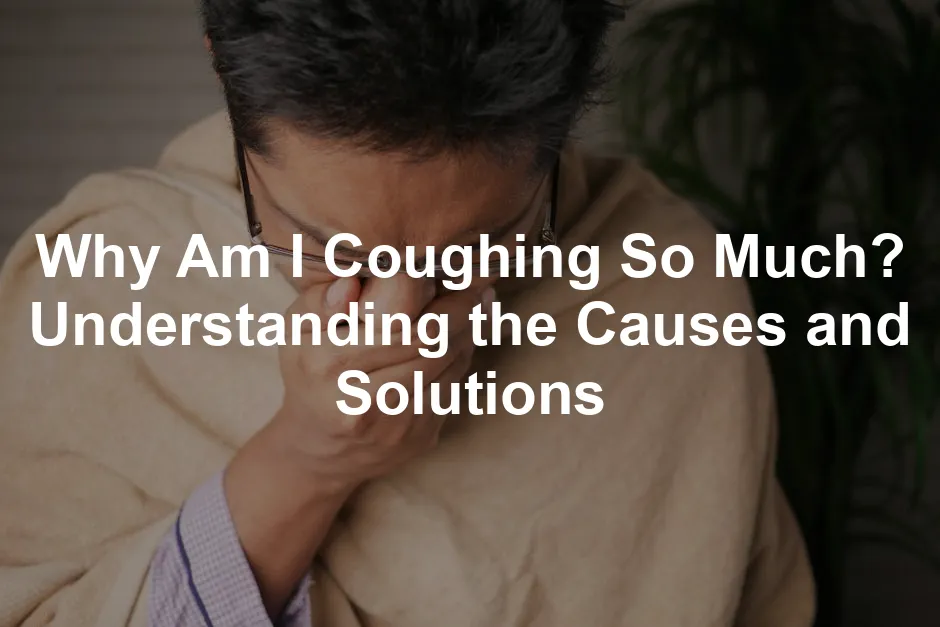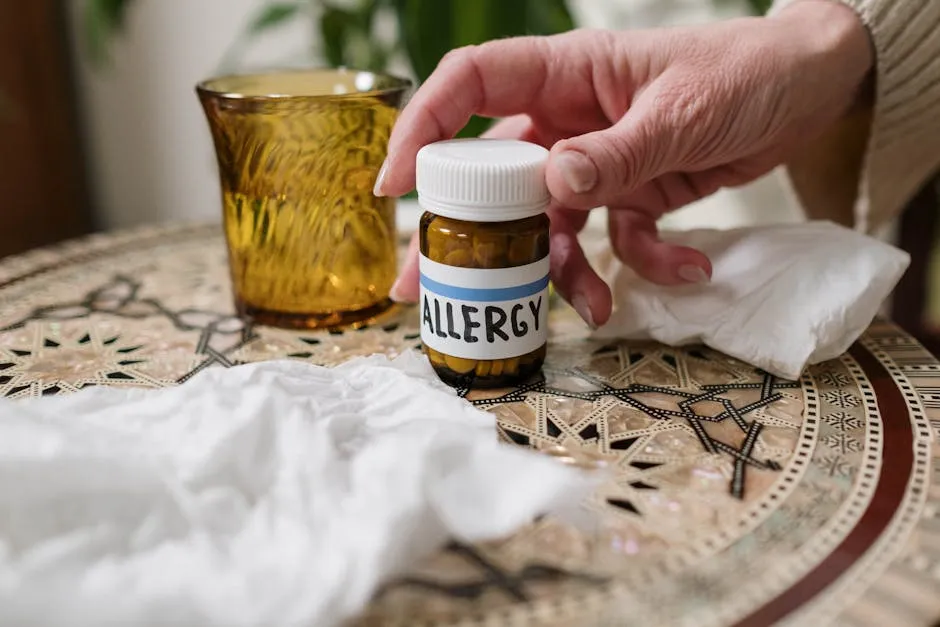
Why Am I Coughing So Much? Understanding the Causes and Solutions
Introduction
Coughing is a common occurrence in our daily lives. Most of us experience it at some point. However, understanding why you might be coughing persistently is crucial. This article will focus on various causes of a chronic cough and when it’s time to seek medical help.
Summary and Overview
Coughing is your body’s way of clearing irritants from the airways. It serves as a protective reflex. There are two main types of coughs: acute and chronic. Acute coughs last less than three weeks, often caused by illnesses like colds or flu. Chronic coughs persist for eight weeks or longer, potentially signaling a more serious issue. Causes can range from benign conditions, such as allergies, to serious concerns like lung cancer. Recognizing symptoms that require medical attention is essential for effective treatment.

And speaking of effective treatment, if you’re looking for a natural remedy, consider adding raw honey to your wellness routine. It’s not just sweet; it can soothe your throat and help combat coughs. Just remember, it’s a no-go for kids under one year!
Understanding Coughs
What is a Cough?
A cough is a vital reflex that helps protect your airways. It removes mucus, microbes, and other irritants from the respiratory tract. When an irritant is detected, nerves send signals to the brain. This prompts muscles in your chest to push air out, expelling the irritant. There are two main types of coughs: dry coughs, which don’t produce mucus, and productive coughs, which do. A normal cough is common, but frequent coughing may indicate an underlying issue.

Acute vs. Chronic Cough
Acute coughs last less than three weeks and are often caused by upper respiratory infections, such as colds or flu. Other causes include inhaling irritants like smoke or dust. Chronic coughs last longer than eight weeks and can stem from several conditions. These include asthma, allergies, chronic bronchitis, or gastroesophageal reflux disease (GERD). Chronic cough is prevalent, affecting 10-20% of the U.S. population. Recognizing the duration and characteristics of your cough is critical for determining the appropriate course of action.
To help alleviate some of those chronic coughs, you might want to try cough drops. A variety pack means you can experiment with flavors while soothing your throat. It’s like a candy store, but for your respiratory health!

Common Causes of Coughing
Allergies
Allergens can make you cough a lot. Seasonal allergies, like pollen in spring, often cause this. Perennial allergies, such as dust mites or pet dander, can also trigger coughing year-round. When exposed to these allergens, your body reacts. This reaction causes inflammation in your airways, leading to coughing. You might also notice sneezing, itchy eyes, or a runny nose. In fact, allergic rhinitis affects about 40 to 60 million Americans each year. If you find yourself coughing frequently, consider whether allergens could be the culprit.

For those pesky allergy symptoms, having some allergy relief medication on hand can be a lifesaver. Say goodbye to those annoying sniffles and coughs!
Asthma
Asthma can cause persistent coughing, especially in children. This condition narrows the airways, making breathing difficult. Cough-variant asthma is when coughing is the main symptom, without wheezing. Triggers can include dust, smoke, or cold air. You might experience chest tightness or shortness of breath during an asthma attack. Understanding your triggers is essential for managing asthma effectively. If you suspect asthma, consult a healthcare provider for proper diagnosis and management.

Gastroesophageal Reflux Disease (GERD)
GERD can lead to a frustrating cough. This occurs when stomach acid flows back into the esophagus, irritating it. This irritation can trigger a cough reflex, even if you don’t feel heartburn. Other symptoms include a sour taste in your mouth or a lump sensation in your throat. Lifestyle changes, like avoiding spicy foods or eating smaller meals, can help manage GERD. Medications that reduce stomach acid may also provide relief. If coughing persists, consider discussing symptoms with a doctor.

Chronic Obstructive Pulmonary Disease (COPD)
COPD is a group of lung diseases that can cause chronic coughing. It includes chronic bronchitis and emphysema. Chronic bronchitis leads to mucus production, while emphysema damages the air sacs in your lungs. Common symptoms of COPD include a persistent cough, shortness of breath, and wheezing. Smoking is a major risk factor for developing COPD. If you experience these symptoms, it’s vital to seek medical advice promptly. Early diagnosis and treatment can significantly improve your quality of life.

Infections
Coughing often signals respiratory infections. Common culprits include bronchitis and pneumonia. Bronchitis causes inflammation in the airways, leading to a persistent cough. Pneumonia, an infection of the lungs, can produce a cough with colored mucus. Even after recovering from these infections, you might still cough. This lingering symptom is known as a post-viral cough. It occurs as your airways heal from irritation. While annoying, it usually resolves on its own within weeks. However, if it lasts longer, consulting a healthcare provider is wise.

To help with respiratory infections, consider using a cool mist humidifier. It can keep your throat moist and ease that irritating cough. Plus, who doesn’t love a little extra moisture in the air?
Environmental Irritants
Smoke, pollution, and chemicals can trigger coughing. Common irritants include cigarette smoke, vehicle emissions, and strong cleaning products. These substances can inflame your airways, leading to discomfort. To reduce exposure, try to avoid smoking and limit time in polluted areas. Keeping windows closed on high pollution days can help. Using air purifiers indoors may also reduce irritants. A clean, allergen-free environment contributes to better respiratory health. Remember, your lungs will thank you for taking these simple steps!

For a cleaner environment, consider investing in an air purifier with HEPA filter. It can significantly reduce airborne irritants, making breathing easier and less cough-inducing!
Medication Side Effects
Certain medications can cause a persistent cough. One common example is ACE inhibitors, often prescribed for high blood pressure. These medications can irritate the throat, leading to chronic coughing. If you notice this side effect, don’t hesitate to reach out to your healthcare provider. They can suggest alternative treatments or adjustments to your medication. It’s crucial to communicate openly about side effects. Your comfort and health matter, so don’t ignore this symptom!

Less Common Causes
While many coughs stem from common issues, some less common causes exist. Conditions like lung cancer or heart disease can also lead to coughing. Psychological factors, such as stress, may contribute as well. If you notice alarming symptoms, such as unexplained weight loss, persistent pain, or coughing up blood, seek medical attention immediately. Early detection is key to addressing serious health concerns effectively. Always listen to your body—it’s better to be safe than sorry!

When to Seek Help
If your cough lasts longer than three weeks, it’s time to consult a healthcare provider. A persistent cough can signal an underlying issue. Pay attention to other symptoms that may indicate a more serious condition.
Watch for alarming signs like difficulty breathing, chest pain, or coughing up blood. If you experience fever, chills, or thick, discolored mucus, seek medical advice. These could be signs of an infection requiring treatment.
Ignoring a chronic cough might lead to complications. Remember, it’s always better to be cautious. Your health matters, so don’t hesitate to reach out for professional help.

Treatment Options
Home Remedies and Over-the-Counter Treatments
Many coughs can be managed at home. Staying hydrated is crucial. Drinking warm fluids, like tea or broth, can soothe your throat and thin mucus. A humidifier adds moisture to the air, which can ease coughing, especially in dry environments.

Cough drops or hard candies can help relieve throat irritation. Honey is a natural remedy too—just avoid it for children under one year. Over-the-counter medications, such as decongestants or expectorants, can provide relief. Guaifenesin is popular for thinning mucus, while dextromethorphan can suppress coughs. Always follow dosage instructions.

If your cough persists, consider consulting a healthcare professional for tailored advice.
Medical Treatments
Medical treatments depend on the underlying cause of your cough. Prescription medications may be necessary for conditions like asthma or bacterial infections. For gastroesophageal reflux disease (GERD), doctors might recommend proton pump inhibitors to reduce stomach acid. If you experience stomach pain when coughing, it may be worth exploring this further. Learn more about why coughing might cause stomach pain.

If allergies are the cause, antihistamines can help. In cases of chronic obstructive pulmonary disease (COPD), bronchodilators may provide relief. It’s essential to address the root issue to prevent the cough from returning. Always discuss with your healthcare provider for the best treatment plan tailored to your needs.
FAQs
What is the difference between a dry cough and a wet cough?
A dry cough does not produce mucus and feels tickly. It’s often caused by irritants, allergies, or dry air. A wet cough, on the other hand, brings up mucus and can indicate conditions like bronchitis or pneumonia. Understanding these differences can help you identify potential underlying issues.
Can a cough be a symptom of COVID-19?
Yes, a cough is a common symptom of COVID-19. However, it can also result from colds or flu. If your cough is persistent and accompanied by fever or loss of taste, consider getting tested for COVID-19. It’s essential to differentiate between viral infections for proper care.
How long can a post-viral cough last?
A post-viral cough can last several weeks after the initial infection has resolved. In many cases, it subsides with time. However, if it persists beyond three weeks or worsens, consulting a healthcare provider is advisable to rule out other causes.
Are there any home remedies to soothe a cough?
Yes, several home remedies can help. Drinking warm fluids, using a humidifier, and consuming honey can soothe your throat. Ginger tea or warm water with lemon can also provide relief. These remedies can be effective in managing mild coughs.
What should I do if I cough up blood?
Coughing up blood is a serious symptom and requires immediate medical attention. It could indicate severe conditions like infections, lung cancer, or blood vessel issues. If you experience this symptom, seek help from a healthcare provider right away for proper evaluation and care.
Please let us know what you think about our content by leaving a comment down below!
Thank you for reading till here 🙂 And remember, a good essential oil diffuser can turn your space into a relaxing oasis, perfect for unwinding after a long day of battling coughs!
All images from Pexels




